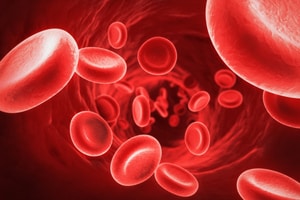
Blood cells grown in a laboratory have been transfused into patients in a world-first clinical trial carried out by a team of UK researchers.
It is hoped the approach could ‘revolutionise’ treatments for people with blood disorders such as sickle cell disease and rare blood types who require regular long-term blood transfusions
The RESTORE trial is a joint research initiative by the universities of Bristol and Cambridge, NHS trusts and NHS Blood and Transplant.
The manufactured blood is grown from stem cells from donated blood, which are stimulated to expand into large numbers of red blood cells in the lab – a process that takes about three weeks.
Two patients have already been transfused with tiny amounts of the lab grown red cells – about one to two teaspoons full – with no adverse side effects reported.
A minimum of ten patients will receive two mini transfusions at least four months apart, one of standard donated red cells and one of lab grown red cells, to find out if the young red blood cells made in the lab last longer than cells made in the body.
If the manufactured cells last longer in the body, patients who regularly need blood may not need transfusions as often. That would reduce iron overload from frequent blood transfusions, which can lead to serious complications.
“We hope our lab grown red blood cells will last longer than those that come from blood donors. If our trial, the first such in the world, is successful, it will mean that patients who currently require regular long-term blood transfusions will need fewer transfusions in future, helping transform their care,” said chief investigator professor Cedric Ghevaert, professor in transfusion medicine and consultant haematologist at the University of Cambridge and NHS Blood and Transplant.
Further trials are needed before clinical use, the team outlined, but the research marks a significant step in using lab grown red blood cells to improve treatment for patients with rare blood types or people with complex transfusion needs.
Dr Farrukh Shah, medical director of transfusion for NHS Blood and Transplant, said: “This world leading research lays the groundwork for the manufacture of red blood cells that can safely be used to transfuse people with disorders like sickle cell. The need for normal blood donations to provide the vast majority of blood will remain. But the potential for this work to benefit hard to transfuse patients is very significant.”




